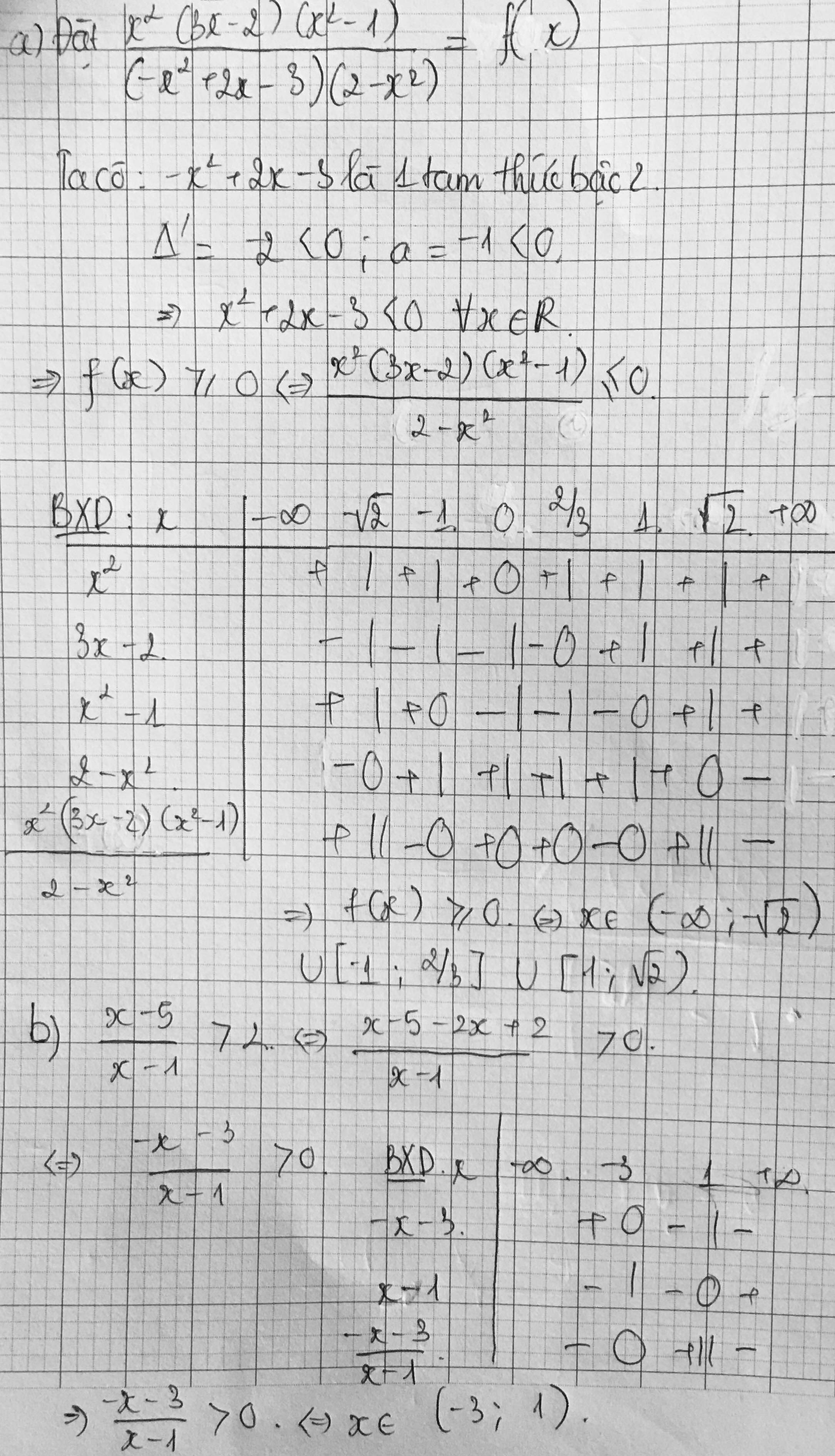
Hãy nhập câu hỏi của bạn vào đây, nếu là tài khoản VIP, bạn sẽ được ưu tiên trả lời.


a: \(\Leftrightarrow\dfrac{15-2x-1}{5}>\dfrac{x+3}{4}\)
\(\Leftrightarrow\dfrac{-8x+56}{20}>\dfrac{5x+15}{20}\)
=>-8x+56>5x+15
=>-11x>-41
hay x<41/11
b: \(\Leftrightarrow\dfrac{5x+5-6}{6}< \dfrac{4x+4}{6}\)
=>5x-1<4x+4
=>x<5
\(3-\dfrac{2x+1}{5}>x+\dfrac{3}{4}.\)
\(\Leftrightarrow\dfrac{14-2x}{5}-x-\dfrac{3}{4}>0.\)
\(\Leftrightarrow\dfrac{56-8x-20x-15}{20}>0.\)
\(\Rightarrow-28x+41>0.\)
\(\Leftrightarrow-28x>-41.\)
\(\Leftrightarrow x< \dfrac{41}{28}.\)

b: \(\Leftrightarrow x^2-2x+1-x+1=0\)
\(\Leftrightarrow x=1\)

a) \(x-\sqrt{2x+3}=-2x\)
\(\Leftrightarrow\sqrt{2x+3}=x+2x\)
\(\Leftrightarrow\sqrt{2x+3}=3x\)
\(\Leftrightarrow2x+3=9x^2\)
\(\Leftrightarrow9x^2-2x-3=0\)
\(\Rightarrow\Delta=\left(-2\right)^2-4\cdot9\cdot\left(-3\right)=112>0\)
\(\Leftrightarrow\left[{}\begin{matrix}x_1=\dfrac{2+\sqrt{112}}{18}=\dfrac{1+2\sqrt{7}}{9}\\x_2=\dfrac{2-\sqrt{112}}{18}=\dfrac{1-2\sqrt{7}}{9}\end{matrix}\right.\)
b) \(\dfrac{1}{x}=1-\dfrac{1}{x+1}\) (ĐK: \(x\ne0,x\ne-1\))
\(\Leftrightarrow\dfrac{1}{x}+\dfrac{1}{x+1}=1\)
\(\Leftrightarrow\dfrac{x+1}{x\left(x+1\right)}+\dfrac{x}{x\left(x+1\right)}=1\)
\(\Leftrightarrow\dfrac{x+1+x}{x\left(x+1\right)}=1\)
\(\Leftrightarrow\dfrac{2x+1}{x^2+x}=1\)
\(\Leftrightarrow2x+1=x^2+1\)
\(\Leftrightarrow x^2-2x=0\)
\(\Leftrightarrow x\left(x-2\right)=0\)
\(\Leftrightarrow\left[{}\begin{matrix}x=0\left(ktm\right)\\x-2=0\end{matrix}\right.\)
\(\Leftrightarrow x=2\left(tm\right)\)
c) \(\dfrac{2}{\sqrt{x+3}}=\dfrac{1}{\sqrt{x^2-9}}\) (ĐK: \(x\ge3\))
\(\Leftrightarrow2\sqrt{x^2-2}=\sqrt{x+3}\)
\(\Leftrightarrow\sqrt{4\left(x^2-9\right)}=\sqrt{x+3}\)
\(\Leftrightarrow4\left(x^2-9\right)=x+3\)
\(\Leftrightarrow4x^2-36=x+3\)
\(\Leftrightarrow4x^2-x-36-3=0\)
\(\Leftrightarrow4x^2-x-39=0\)
\(\Rightarrow\Delta=\left(-1\right)^2-4\cdot4\cdot\left(-39\right)=625>0\)
\(\Leftrightarrow\left[{}\begin{matrix}x_1=\dfrac{1+\sqrt{625}}{8}=\dfrac{13}{4}\left(tm\right)\\x_2=\dfrac{1-\sqrt{625}}{8}=-3\left(ktm\right)\end{matrix}\right.\)

a: 3x+2y-6>0
Thay x=0 và y=0 vào BPT, ta được:
\(3\cdot0+2\cdot0-6>0\)
=>-6>0(vô lý)
Vậy: Miền nghiệm của BPT 3x+2y-6>0 là nửa mặt phẳng không chứa biên và cũng không chứa điểm O(0;0) của đường thẳng 3x+2y-6=0
b: 3x+2y+6>=0
Khi x=0 và y=0 thì \(3x+2y+6=3\cdot0+2\cdot0+6=6>0\)(đúng)
=>Miền nghiệm của BPT 3x+2y+6>=0 là nửa mặt phẳng vừ chứa biên vừa chứa điểm O(0;0) của đường thẳng 3x+2y+6=0

a, Phương trình có hai nghiệm phân biệt khi \(\Delta'=\left(m+1\right)^2-\left(4m^2-2m-2\right)=-3m^2+4m+3>0\)
\(\Leftrightarrow\dfrac{2-\sqrt{13}}{3}< m< \dfrac{2+\sqrt{13}}{3}\)
b, Yêu cầu bài toán thỏa mãn khi:
\(\left\{{}\begin{matrix}\Delta'>0\\2\left(m+1\right)>0\\4m^2-2m-2>0\end{matrix}\right.\)
\(\Leftrightarrow...\)

a, \(Chof\left(x\right)=0\Rightarrow\left[{}\begin{matrix}x=3\\x=4\end{matrix}\right.\)
- Lập bảng xét dấu :
Vậy \(\left\{{}\begin{matrix}f\left(x\right)>0\Leftrightarrow x\in\left(3;4\right)\\f\left(x\right)< 0\Leftrightarrow x\in\left(-\infty;3\right)\cup\left(4;+\infty\right)\\f\left(x\right)=0\Leftrightarrow x\in\left\{3;4\right\}\end{matrix}\right.\)
b, \(f\left(x\right)=\left(x-1\right)\left(x+6\right)\)
( Làm tương tự câu a )

Ta có các hạng tử là:
\(\dfrac{1}{2}=\dfrac{1}{1\cdot2};\dfrac{1}{6}=\dfrac{1}{2\cdot3};\dfrac{1}{12}=\dfrac{1}{3\cdot4};\dfrac{1}{20}=\dfrac{1}{4\cdot5};...;\dfrac{1}{9900}=\dfrac{1}{99\cdot100}\)
Ta thấy tất cả đề là: \(\dfrac{1}{x\left(x+1\right)}\)
Tính chất đặc trưng của tập hợp là:
\(A=\left\{\dfrac{1}{x\left(x+1\right)}|x\in N,1\le x\le99\right\}\)
